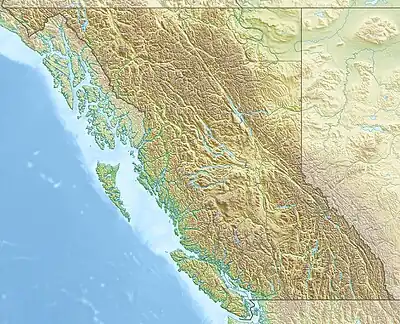Riley Creek (Middle Creek tributary)
Riley Creek is a tributary of Middle Creek, which in turn is a tributary of the Tahltan River, part of the Stikine River watershed in northwest part of the province of British Columbia, Canada.[4][7] It flows generally south for roughly 10 km (6.2 mi)[5] to join Middle Creek about 1.5 km (0.93 mi) north of Middle Creek's confluence with the Tahltan River. Riley Creek's watershed covers 22.1 km2 (8.5 sq mi),[6] and its mean annual discharge is estimated at 0.192 m3/s (6.8 cu ft/s).[6] The mouth of Riley Creek is located about 22 km (14 mi) north of Telegraph Creek, British Columbia, about 74 km (46 mi) southwest of Dease Lake, British Columbia, and about 122 km (76 mi) east of Juneau, Alaska. Riley Creek's watershed's land cover is classified as 39.9% shrubland, 36.8% conifer forest, 20.3% mixed forest, and small amounts of other cover.[6]
| Riley Creek | |
|---|---|
 Mouth of Riley Creek | |
| Location | |
| Country | Canada |
| Province | British Columbia |
| District | Cassiar Land District |
| Physical characteristics | |
| Source | Level Mountain |
| • location | Nahlin Plateau |
| • coordinates | 58°10′21″N 131°0′24″W[1] |
| • elevation | 1,190 m (3,900 ft)[2][3] |
| Mouth | Middle Creek |
• coordinates | 58°5′47″N 131°4′19″W[4][3] |
• elevation | 501 m (1,644 ft)[2] |
| Length | 10 km (6.2 mi)[5] |
| Basin size | 22.1 km2 (8.5 sq mi),[6] |
| Discharge | |
| • average | 0.192 m3/s (6.8 cu ft/s)[6] |
| Basin features | |
| Topo map | NTS 104J3 Tahltan River |
Riley Creek is in the traditional territory of the Tahltan First Nation, of the Tahltan people.[8][9]
Geography
Riley Creek originates on the southeast edge of the massive Level Mountain shield volcano, about 42 km (26 mi) southeast of Meszah Peak, the highest peak of the Level Mountain Range, a cluster of bare peaks on the summit of Level Mountain. From its source near Classy Creek, Mansfield Creek, and Hartz Creek, Riley creek flows generally south and through a forested gorge to Middle Creek,[10] which in turn empties into the Tahltan River.[11][3][12]
See also
References
- Derived from BCGNIS, topographic maps, and Toporama
- Elevation derived from ASTER Global Digital Elevation Model, using GeoLocator, BCGNIS coordinates, and topographic maps.
- "Toporama (on-line map and search)". Atlas of Canada. Natural Resources Canada. Retrieved 31 August 2021.
- "Riley Creek". BC Geographical Names.
- Length measured using BCGNIS coordinates, topographic maps, and Toporama
- "Northwest Water Tool". BC Water Tool. GeoBC, Integrated Land Management Bureau, Ministry of Agriculture and Lands, Government of British Columbia. Retrieved 31 August 2021.
- "Riley Creek". Geographical Names Data Base. Natural Resources Canada.
- "Our Territory". Tahltan Central Government. Retrieved 28 August 2021.
- "Dah Ki Mi — "Our House"". Tahltan Band Council. Retrieved 31 August 2021.
- "Middle Creek". BC Geographical Names.
- "Tahltan River". BC Geographical Names.
- Mussio, Russell; Mussio, Wesley (2018). Northern BC Backroad Mapbook. Mussio Ventures. p. 96. ISBN 978-1-926806-87-7. Retrieved 31 August 2021.